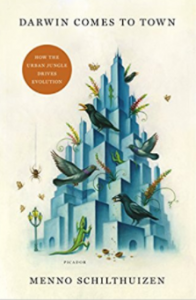
Walk to the wild side


Urban ecologist Schilthuizen studying how our manmade environments and in a world of adapt or die, the wildlife sharing these spaces with us is being forced to adopt fascinating new ways of surviving and often thriving.
Darwin Comes to Town paints several eye-popping examples to share a stunning vision of urban evolution in which human and wildlife co-exist in a unique harmony,
Carrion Crow in the Japanese city of Sendai has learned to use passing traffic to crack nuts. Spiders in Vienna are adapting to build their webs near moth-attracting streetlights, while moths in some cities are developing a resistance to the lure of light bulbs, In Puerto Rico, City lizards are evolving feet that better grip surfaces like concrete.
In Hampstead Heath, London, early morning is serenaded by a chorus of birdsong by robins and blackbirds.
In Kerala, India, a baby elephant strolls from the forest to a village and falls into a ditch, followed by a family of wild elephants who watches and waits on the other side of the river, when the baby elephant is rescued by local people and forest officials, the head elephant turns head and salutes the humans thanking them.
Menno Schilthuizen’s insight into the emerging science of urban ecology is a brilliant reproach to all the biologists who believe that their true calling is to study the “vanishing quantity of unspoilt nature”, including the dwindling areas of forest and wilderness little touched by human activity and the evolutionary change of landscape in the towns and cities where most of them live.
Passionate Schilthuizen, the defender of wild and open spaces, wept angry tears at the loss to Rotterdam of the meadows and marshes where he studied nature as a boy.
He emphasises despite the rapid pace of urbanisation worldwide, biologists should make more effort to study the way some plants and animals adapt to living within dense human populations. Their finding will helps planners to developers to design cities that can sustain as much wildlife as possible.
Darwinian evolution urges us to adapt to changing environmental circumstances through natural selection – can take place more rapidly than Charles Darwin realised, as this book is packed with species evolving to thrive in cities including the European blackbird Turdus merula. The house mosquito Culex Molestus, which evolved during the 20th century to live in the tunnels of the underground, while the above ground mosquito feeds on bird blood, mate in swarms and hibernate.
Paul McCartney wrote in 1968, “Blackbird singing in the dead of night..you were only waiting for this moment to arise”.
Darwin Comes to Town: How the Urban Jungle Drives Evolution by Menno Schilthuizen, Quercus £ 14.99, 352 pages.
